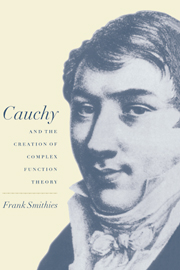Book contents
- Frontmatter
- Contents
- Introduction
- 1 The background to Cauchy's work on complex function theory
- 2 Cauchy's 1814 memoir on definite integrals
- 3 Miscellaneous contributions (1815–1825)
- 4 The 1825 memoir and associated articles
- 5 The calculus of residues
- 6 The Lagrange series and the Turin memoirs
- 7 Summary and conclusions
- References
- Notation index
- Author index
- Subject index
5 - The calculus of residues
Published online by Cambridge University Press: 10 October 2009
- Frontmatter
- Contents
- Introduction
- 1 The background to Cauchy's work on complex function theory
- 2 Cauchy's 1814 memoir on definite integrals
- 3 Miscellaneous contributions (1815–1825)
- 4 The 1825 memoir and associated articles
- 5 The calculus of residues
- 6 The Lagrange series and the Turin memoirs
- 7 Summary and conclusions
- References
- Notation index
- Author index
- Subject index
Summary
5.1. In 1826 Cauchy began to publish his Exercices de Mathématiques, which was essentially a mathematical periodical consisting entirely of papers written by himself; it appeared at approximately monthly intervals until 1830. He used similar series as vehicles for his publications at later stages of his career; the Nouveaux Exercices de Mathématiques were published in Prague in 1835–36 and the Exercices d'Analyse et de Physique Mathématique appeared at intervals from 1840 to 1853.
Some of the work appearing in the Exercices is expository in character, but much of it contains original research. In particular, as we shall see, his main contributions to what he called the calculus of residues are to be found there.
In the present chapter we shall describe Cauchy's definition of the notion of residue and the way in which he used it for the further development of complex function theory. We shall omit some of the applications he made of it between 1826 and 1830, in particular its use to obtain explicit expressions for solutions of differential equations, and his work on operational methods, which is more closely linked to the theory of Fourier transforms.
5.2. The notion of the residue of a function at a point where the function becomes infinite is defined in Cauchy's paper [1826a] in the first number of the Exercices. His definition is as follows.
- Type
- Chapter
- Information
- Cauchy and the Creation of Complex Function Theory , pp. 113 - 146Publisher: Cambridge University PressPrint publication year: 1997



